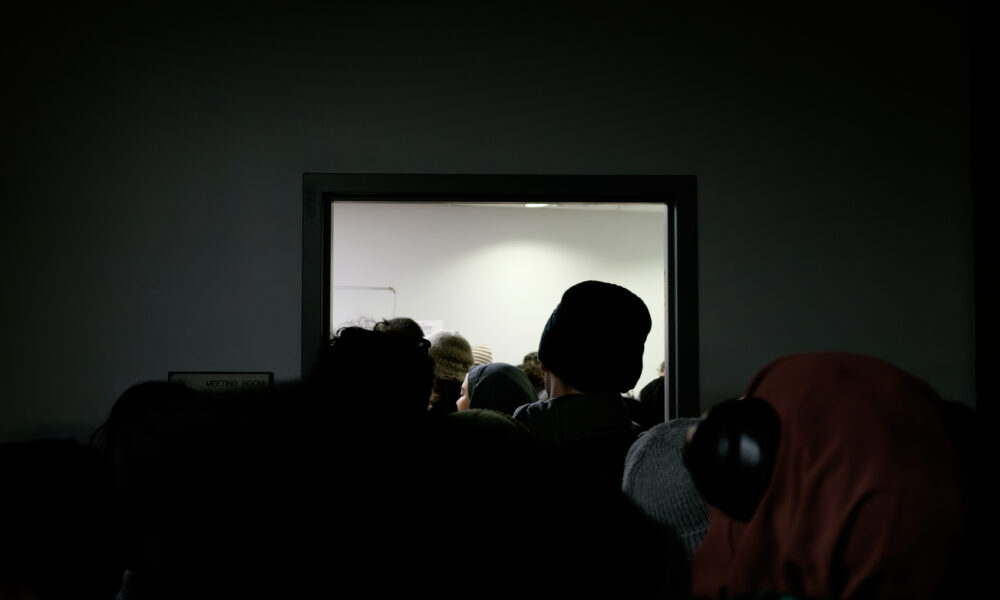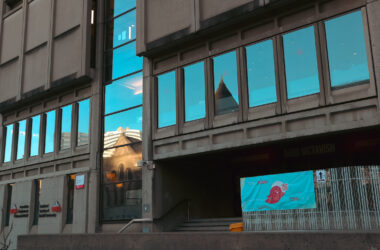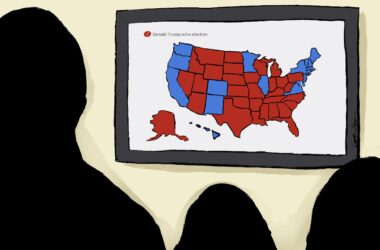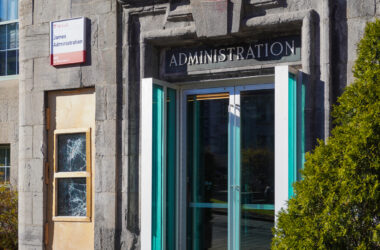Roughly one hundred students disrupted the Students’ Society of McGill University’s (SSMU) Board of Directors (BoD) meeting on Nov. 30 to voice their support for the Policy Against Genocide in Palestine. Students questioned executives face-to-face on the Society’s decision to consent to an injunction against the policy—a decision that has paused the policy’s ratification until at least March 25, when the case will be heard in court.
The Policy Against Genocide in Palestine passed with 5,974 students—78.7 per cent of non-abstaining voters—casting a “Yes” vote in SSMU’s Fall Referendum. The injunction was filed on Nov. 21 by an anonymous McGill student with support from B’nai Brith Canada, a Jewish service and advocacy organization. On Nov. 23, the Quebec Superior Court issued a safeguard order, leading SSMU to pause the Policy’s ratification.
McGill’s administration has also resisted the Policy, telling SSMU that it would “sharpen divisions” and is thus a violation of SSMU’s constitution—making it a violation of the Memorandum of Agreement between SSMU and the university.
Solidarity for Palestinian Human Rights (SPHR) McGill held a Student Rally Against Genocide on Nov. 30 to reaffirm their support for the Policy. The rally began at 5 p.m. outside of the Arts Building and included speeches emphasizing the students’ commitment to Palestinian liberation and the Policy. An SPHR McGill representative who wished to remain anonymous asserted that they believe that the injunction stands in the way of the democratic process.
“Legal warfare is an attempt to diverge us from our path by using law and biased regulations and bureaucratic procedures designed to repress and undermine any Palestinian student activism,” the representative said. “McGill, SSMU, and Canada have clearly spoken: Democracy is conditional and not applicable when we are speaking for Palestine. This establishes a dangerous model for student democracy and activism in Montreal, a precedent that SPHR McGill rejects and vows to pursue.”
Before 6 p.m., the protesters moved from the Arts Building to the lobby of the University Centre, where the SSMU BoD meeting was taking place metres away in the SSMU offices. The meeting began with the BoD answering a pre-submitted question about what steps they would take to “make sure that […] student democratic action is upheld and respected.” The question also asked how SSMU would ensure communication of their stances regarding the Policy. In response, SSMU Vice President (VP) Student Life Nadia Dakdouki explained that SSMU communications are ultimately intended to avoid causing confusion.
“We only really communicate final decisions [….] If there’s something being discussed that is not finalized for […] legal considerations, it is not useful in the sense that it will only cause more confusion,” Dakdouki said. “So I know there’s been concerns in the past week, but it’s really just because everything has been moving so fast, and we’re doing our best to be as transparent as we can within the bounds of legality and confidentiality.”
According to SPHR McGill, SSMU had notified the group the morning of the meeting that no student observers would be allowed to attend the public session of the meeting to ask questions—which SPHR McGill cited as a “break of [SSMU’s] normal procedure.” In lieu of attending the meeting in person, SPHR McGill says that they were allowed to ask one question over Zoom. When the group asked a second question, SPHR McGill claims that SSMU “forcibly muted” them, after which organizers led protesters into the BoD’s meeting room.
SSMU executives asserted that they did not intend to silence students’ voices in an email to The Tribune.
“The Speaker chose to move members attending the public session online in order to accommodate the large number of people wishing to attend and ask questions,” the SSMU executives wrote. “At the discretion of the Speaker (and in accordance with our standing rules), because of the large quantity of questions, the procedure for question period was that each person should ask one question, then get back in line should they have another question to allow others to ask their own questions.”
“The member started asking their second question, and the Speaker intervened to clarify that the member would have to raise their hand (on Zoom) and wait their turn in the queue to ask their next question. The member was muted so that the Speaker could clarify the rules of question period and to take the next member’s question. There was no intention to stifle the voices or questions of members.”
The BoD meeting adjourned as protesters chanting “Free, free Palestine” crowded the meeting around 6:30 p.m. In the BoD meeting room, the protesters confronted the SSMU executives and board members about the injunction. According to a representative from SPHR McGill, none of the SSMU executives were present at the injunction hearing, a claim which no SSMU executive denied. SSMU President Alexandre Ashkir told ralliers that SSMU was not happy with its previous legal counsel, and has since hired new legal representation.
He also voiced his opinion that students should be upset at the legal process, not SSMU.“I respect the effort, I respect the rally […] but the reality is we’re stuck in legal fuckery and instead of protesting the courts and protesting the people suing us, you’re protesting us,” Ashkir said.
A student asked, “If the struggle was to find lawyers who would stand up for us, why not be in the room and hold them accountable?” The executives began to answer but were interrupted by the students’ many questions that followed.
Next, a member of Law Students for Palestine at McGill (LS4PM) condemned SSMU’s agreement to the injunction, saying that by doing so, SSMU’s lawyers knowingly paused the ratification for months. They also asked why SSMU did not accept help from LS4PM, despite their offers. Ashkir replied saying that SSMU had indeed used LS4PM’s assistance to find new legal counsel and thanked the organization.
LS4PM did not reply to The Tribune’s requests for clarification and comment by the publication deadline.
In an email to The Tribune, SSMU stated that it had already begun interviewing law firms by the time LS4PM reached out. SSMU said that it nonetheless took advice from LS4PM on what firm they would recommend. By the time they heard back, SSMU had already chosen Sibel Ataogul from Melançon Marceau Grenier Cohen, which was also LS4PM’s recommendation. “While our decision was made independently of LS4PM, their offer of legal help was appreciated and considered,” the SSMU executives wrote.
In response to further questions, Ashkir explained that while SSMU had not yet met with their lawyers to discuss strategy, they intend to defend the Policy in court. After Ashkir reiterated SSMU’s support for the Policy, the protesters moved back to the lobby of the University Centre, with Ashkir joining the rally.
Back in the lobby, Ashkir requested to make a speech to the crowd. He started speaking but attendees quickly interrupted him by shouting questions about the injunction. One student asked again why Ashkir was not present for the injunction hearing. Ashkir responded that he “didn’t have the time,” prompting cries of “Shame” from the crowd.
Isaiah, a representative of Independent Jewish Voices (IJV) McGill who asked for only his first name to be used, shouted, “In less than two months, more than 15,500 people are dead. How do we have until March?” to which Ashkir responded, “We don’t. All we can do right now is […] work around a legal case that is […] pinning us down.”
Another student began chanting “The students, united, will never be defeated,” which eventually gained traction among the crowd.
The rally ended with more speeches, including one from IJV McGill.
“I hope [SSMU] recognizes that the overwhelming support and the voice of the students isn’t just a vote or a number, it’s a real thing,” Isaiah said in an interview with The Tribune. “We brought hundreds of students here today to mobilize and make our voices heard in real life. They have a responsibility to step up to defend the […] mandate from the students right now. And we’re going to keep pushing them until we see that happen.”










